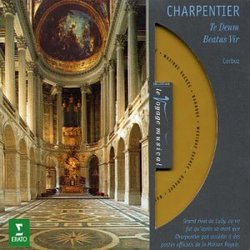| All Artists: Huttenlocher, Corboz, Orchestrede La Fondation Gulbenkian Title: Charpentier: Te Deum; Beatus Vir Members Wishing: 0 Total Copies: 0 Label: Erato Original Release Date: 1/1/2002 Re-Release Date: 8/12/2002 Album Type: Import Genre: Classical Style: Number of Discs: 1 SwapaCD Credits: 1 UPC: 685738293421 |
Search - Huttenlocher, Corboz, Orchestrede La Fondation Gulbenkian :: Charpentier: Te Deum; Beatus Vir
 | Huttenlocher, Corboz, Orchestrede La Fondation Gulbenkian Charpentier: Te Deum; Beatus Vir Genre: Classical
|
Larger Image |
CD DetailsSimilar CDs
|
CD ReviewsRational and clear, that's pure French music Jacques COULARDEAU | OLLIERGUES France | 08/09/2003 (4 out of 5 stars) "Rich constructions but no vain and aimless Italian variations. This is pure and clear music, particularly with Michel Corboz directing it. This music is directly inherited from the Renaissance or an even older tradition, and not from the baroque period that ensues. Balance is probably the most important characteristic. No real fear, no real sombre side in this music, no division or split between a dark side and a bright side in life or in man. How is death expressed ? With no fear but deeply balanced reasoning. There is no way to escape it, so let us face it. It is also extremely catholic : the commandments are to be observed but they are not an everyday yoke. After all let us take things the way they come and let God be free of deeming us in due time. We find there the association of rational Descartes for whom our attitdes and feelings are supposed to be under the control of reason, and jansenist Pascal who bets on God's existence and goes along with His commandments and rites because if He does not exist it does not cost us much, and if He exists it is an insurance for the future. So the music is rational, clear and soft. There are no extreme emotions both towards pleasure or fear, whereas in Bach, with whom Charpentier is often equalled, we always have the clash between those two extremes. So it sounds like a music of reason and not a music of emotions or dilemmas. Dr Jacques COULARDEAU, University of Perpignan"
|

 Track Listings (4) - Disc #1
Track Listings (4) - Disc #1